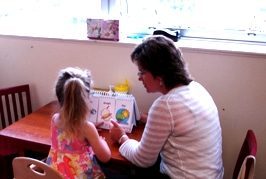Should You Worry If Your Toddler Has Too Few Words?
February, 2011
FROM THE CONNECTION, WARREN-WATCHUNG EDITION
There are lots of reasons a toddler won’t talk—some not serious. But if your 14-month-old isn’t speaking—saying words such as mama, dada, up and more—and isn’t following simple directions, it may be time to ask whether your child has a more serious problem.
 When Mary L. and her 18-month-old daughter Dani first appeared at the office of speech-language pathologist Nancy Polow, Ph.D., CCC, the toddler couldn’t even muster up sounds, let alone simple words. In fact, she was able to produce only a clicking noise when she was asked a question. But by the end of the first session, Mary watched in amazement as her daughter triumphantly produced her first muh sound—a small but significant first step to forming the word mama. “At that moment,” says Dr. Polow, “I knew we could teach Dani to speak. By age five, Dani’s speech was age-appropriate—thanks to intensive speech/language therapy and a very strong home carry-over program.”
When Mary L. and her 18-month-old daughter Dani first appeared at the office of speech-language pathologist Nancy Polow, Ph.D., CCC, the toddler couldn’t even muster up sounds, let alone simple words. In fact, she was able to produce only a clicking noise when she was asked a question. But by the end of the first session, Mary watched in amazement as her daughter triumphantly produced her first muh sound—a small but significant first step to forming the word mama. “At that moment,” says Dr. Polow, “I knew we could teach Dani to speak. By age five, Dani’s speech was age-appropriate—thanks to intensive speech/language therapy and a very strong home carry-over program.”
When a non-verbal toddler walks into Suburban Speech Center, Dr. Polow’s practice in Short Hills, NJ, the speech-language pathologist knows she may be facing a problem more complicated than a child who is simply a late talker.
According to Dr. Polow, a speech delay may be an indicator of a serious concern, such as Childhood Apraxia of Speech (CAS)—Dani’s diagnosis. The American-Speech-Language-Hearing Association (ASHA) defines CAS as a “neurological pediatric speech sound disorder in which the precision and consistency of speech movements are impaired, in the absence of neuromuscular deficits.” The degree of impairment can range from mild to severe. By age one, children with CAS may fail to babble, may be unable to point and gesture, and may be unable to use single words or point to body parts. By age two, a child with CAS may be unable to produce two-word phrases or follow directions.
Getting the right therapy and starting treatment early are key to a favorable prognosis. In Dani’s case, a team including a developmental pediatrician, an occupational therapist, a physical therapist and a speech-language pathologist coordinated services to address all of her needs. Children with CAS usually require more intensive therapy and more frequent therapy than children with many other speech disorders. According to Marilyn C. Agin, M.D., a developmental pediatrician in New York City, therapy itself is not a quick fix; children with CAS may need many years of intensive treatment.
When Dr. Polow opened her practice 35 years ago, she rarely saw children exhibiting signs of apraxia. Today, she says, she and her staff of 14 speech-language pathologists find that children with CAS make up almost 15 percent of their patients.
Therapy at Suburban Speech may begin when a child is as young as 14 months. According to Dr. Polow, “Parents come to us upset—and with frustrated children. I assure them that success is very possible.” Highly effective treatment programs used at Suburban Speech include the Kaufman Speech Praxis, PROMPT, PECS, and oral-motor therapy. “With appropriate therapy that is individualized, it is possible over time that a child may be able to function effectively in a classroom and social situations, and will no longer require services,” says Dr.Polow. Nationally-known speech/language pathologist Nancy Kaufman, M.A, CCC/SLP of West Bloomfield, MI, agrees that initiating therapy as soon as a problem is noticed is of utmost importance.
For more information on Childhood Apraxia of Speech, or other speech disorders, contact Dr. Nancy Polow, director of Suburban Speech Center, 748 Morris Turnpike, Short Hills, NJ (973-921-1400).
(Shown above left) at age three-and-a-half, Dani L. and speech-language pathologist Jane Goldberg, M.S., CCC/SLP, worked on skills several times a week at Suburban Speech Center.
